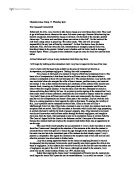The counter offer made by Khan & Co on Tuesday 6 Sept, willing to pay £17500 for the steel also allowed Brown & Co six days to mull over and make a decision. Brown’s did decide to accept the offer well within in the time limit specified by Khan’s. However, they didn’t communicate this acceptance to Khan’s who on Wednesday the 7th, agreed a deal with another company, Steel Supplies to provide steel for £17500. Brown’s acceptance should have been communicated clearly to Khan’s; who had no idea as to the decision made by the Brown’s .The case of Felthouse v Bindley [1862] highlights that silence cannot be amounted to acceptance. It involved the sale of a horse and an individual’s declaration that if he didn’t hear from the other party, he would consider that acceptance and acquire the horse. It was ruled that because there was no clear acceptance from the other side and there was silence he could not claim any ownership to the horse as there was no formal agreement.
The fact that Brown’s agreed to Khan’s counter-offer of £17500 within the time limit can’t result in a claim to having a contract. Khan’s stated that if they were in agreement, Brown’s should let them know before the following Monday therefore, an offer was on the table and nothing had been signed and hands hadn’t been shaken. In the mean time, if Khan’s received an offer identical to the one they gave to Brown’s, they were well within their rights to accept it. If they had rejected the offer from Steel Supplies and then also had their £17500 counter-offer rejected by Brown’s, it would have created further problems for them. They were unsure as to whether Brown’s would accept the counter-offer and so decided to go with Steel Supplies.
“Offer and acceptance must be properly communicated in order to be effective”. There are likely to be occasions where the parties involved in the process aren’t face to face therefore, other methods of communicating their acceptance must be used. The sales manager of Brown’s told his secretary to post the letter of acceptance on Thursday 8th September and the day before, Khan’s had tied up a deal with Steel Supplies. Offers involving the use of letter as a method of communication or acceptance brings in to effect, the “postal rule” This is where the acceptance becomes effective as soon as the letter is posted. A case in point is Adams v Lindsell [1818] which involved the sale of wool between two parties. The letter containing the offer was received late by the offeree which resulted in their letter of acceptance being received late by the offerror; who having not received the letter on the expected day and assumed rejection or silence, sold the wool to a third party. It was ruled that the contract became effective as soon as the letter of acceptance had been posted and the offerror had henceforth, breached the contract by selling the wool on a third party.
With regards to Brown’s, if the sales manager had posted the letter on the Wednesday the 7th as opposed to the Thursday, it would have immediately formed a contract and Khan’s deal with Steel Supplies would have then been seen as a breach of contract. Even if Khan’s didn’t receive the letter of acceptance, the fact that the Sales manager posted the letter before Khan’s shook hands with Steel Supplies would be the most important factor. The postal system can however, sometimes be unreliable with letters being lost, delayed or misdirected meaning the postal rule is effective and shows immediate acceptance. Furthermore, if there was no such rule and the letter only became effective when delivered it could cause unease for both sides. For example, if Brown’s sent the letter in the morning and it reached Khan’s the next day, it wouldn’t have been effective because it was delivered after Khan’s sealed a deal with Steel Supplies. On the other hand, if Khan’s were anticipating a letter from Brown’s confirming their acceptance and they didn’t receive the letter or it was delayed, it would mean a contract hadn’t been formed. When Brown’s accepted the offer, the sales manager should have immediately sent out a letter showing such an acceptance. However, the sales manager didn’t realise that Khan’s had another offer on the table and was only taking in to account the Monday 12th September deadline set by Khan’s to show their acceptance.
Fax can’t be applied by the posting rule****
Acceptance by fax: If you accept an offer by fax, it will probably be to be accepted as it is printed out by the offeror's fax machine, whether or not there is anyone there to receive it. In NM Superannuation Pty Limited v. Hughes (1992) 10 ACLC 477, a decision of the New South Wales Supreme Court, Cohen J held that if a fax is left switched on its owner is indicating their preparedness to receive messages on it and in such circumstances it was sufficient for a notice to be communicated by fax, even though the document might arrive outside normal business hours. The same principles probably apply to other electronic means of communications, such as email but these have so far not been tested in a court.
Basically, acceptance must be communicated effectively. Where timing is, or may be critical, you should agree on a method of acceptance and its timing at the beginning.
As faster communication becomes the
norm, the protection offered by the postal rules has been reduced for others forms of
communication. For example, faxes are communicated when received rather than when
sent, although they need not have been read, or even printed if the fax machine can
save faxes to its memory, as it was in the case of Anson -v- Trump.
http://vlex.co.uk/vid/tes-of-bernal-reporting-180-tel-to-the-52584405
Hyde v Wrench [1840] 3 Bea 334
Felthouse v Bindley [1862]
Jill Poole (2008). Textbook on Contract Law. London. Oxford University Press. p33








